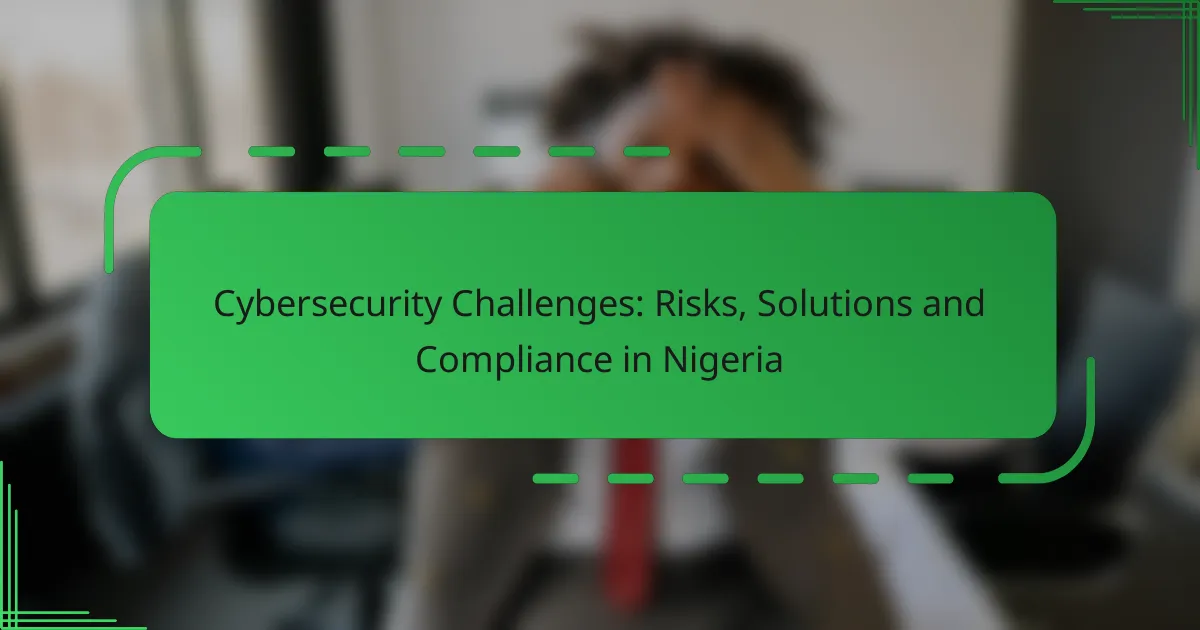Nigeria is grappling with significant cybersecurity challenges that jeopardize both individuals and organizations, including data breaches, phishing, and ransomware threats. To combat these risks, a range of cybersecurity solutions, from technical defenses to employee training, is essential. Compliance with local regulations further enhances data protection and safeguards sensitive information, making it imperative for businesses to adopt robust cybersecurity measures.

What are the cybersecurity risks in Nigeria?
Nigeria faces significant cybersecurity risks that threaten both individuals and organizations. These risks include data breaches, phishing attacks, ransomware threats, and insider threats, each posing unique challenges to the security landscape.
Data breaches
Data breaches in Nigeria often occur when unauthorized individuals gain access to sensitive information, such as personal data or financial records. These incidents can result from weak passwords, inadequate security measures, or vulnerabilities in software systems.
Organizations should implement strong encryption methods and regularly update their security protocols to mitigate the risk of data breaches. Regular audits and employee training on data protection can also enhance overall security posture.
Phishing attacks
Phishing attacks are a prevalent threat in Nigeria, where cybercriminals use deceptive emails or messages to trick individuals into revealing personal information. These attacks can lead to identity theft and financial loss.
To combat phishing, users should be cautious about unsolicited communications and verify the sender’s identity before clicking on links or providing information. Utilizing email filters and security software can help detect and block phishing attempts.
Ransomware threats
Ransomware threats involve malicious software that encrypts a victim’s data, demanding payment for its release. In Nigeria, businesses and government agencies have been targeted, leading to significant operational disruptions.
To protect against ransomware, organizations should maintain regular backups of critical data and ensure that software is up to date. Employee awareness training on recognizing suspicious activities can also reduce the likelihood of falling victim to such attacks.
Insider threats
Insider threats arise when current or former employees misuse their access to sensitive information, either maliciously or inadvertently. This risk is particularly concerning in organizations with inadequate monitoring and access controls.
To address insider threats, companies should implement strict access controls and conduct regular monitoring of user activities. Establishing a clear policy on data usage and providing training on security best practices can further mitigate this risk.
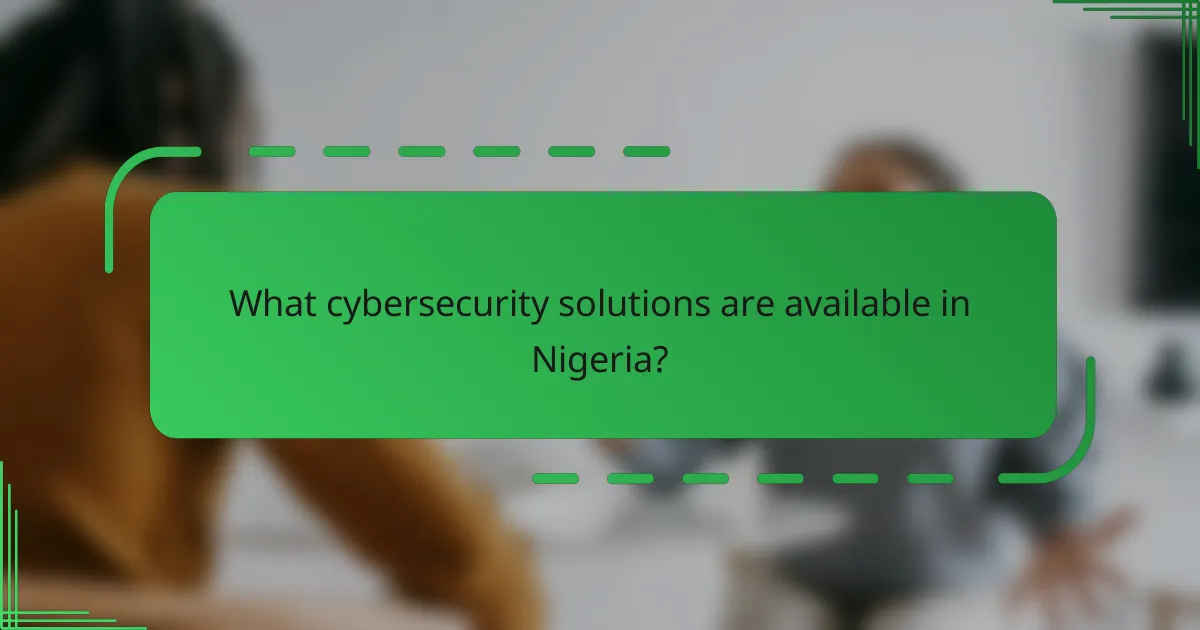
What cybersecurity solutions are available in Nigeria?
In Nigeria, various cybersecurity solutions are essential for protecting organizations from increasing digital threats. These solutions range from technical defenses to employee training and incident management strategies, tailored to meet local challenges.
Firewalls and intrusion detection systems
Firewalls and intrusion detection systems (IDS) are critical components of cybersecurity in Nigeria. Firewalls act as barriers between trusted internal networks and untrusted external networks, filtering incoming and outgoing traffic based on predetermined security rules.
Intrusion detection systems monitor network traffic for suspicious activity and potential threats. Implementing these systems can significantly reduce the risk of unauthorized access and data breaches, making them a fundamental part of any cybersecurity strategy.
Employee training programs
Employee training programs are vital for enhancing cybersecurity awareness among staff in Nigeria. These programs educate employees about common threats such as phishing and social engineering, empowering them to recognize and respond to potential risks.
Regular training sessions, workshops, and simulated attacks can help reinforce good security practices. Organizations should aim for ongoing education rather than one-time training to keep employees informed about evolving threats.
Incident response plans
Incident response plans outline the steps an organization should take in the event of a cybersecurity breach. Having a well-defined plan allows for a swift and organized response, minimizing damage and recovery time.
Key elements of an effective incident response plan include identification of the incident, containment strategies, eradication of the threat, recovery processes, and post-incident analysis. Regularly reviewing and updating the plan is crucial to ensure its effectiveness against new threats.
Multi-factor authentication
Multi-factor authentication (MFA) adds an extra layer of security by requiring users to provide two or more verification factors to gain access to systems or data. This significantly reduces the likelihood of unauthorized access, even if passwords are compromised.
Implementing MFA can involve a combination of something the user knows (like a password), something the user has (like a mobile device), or something the user is (like biometric data). Organizations in Nigeria should prioritize MFA for sensitive accounts and systems to enhance their overall security posture.
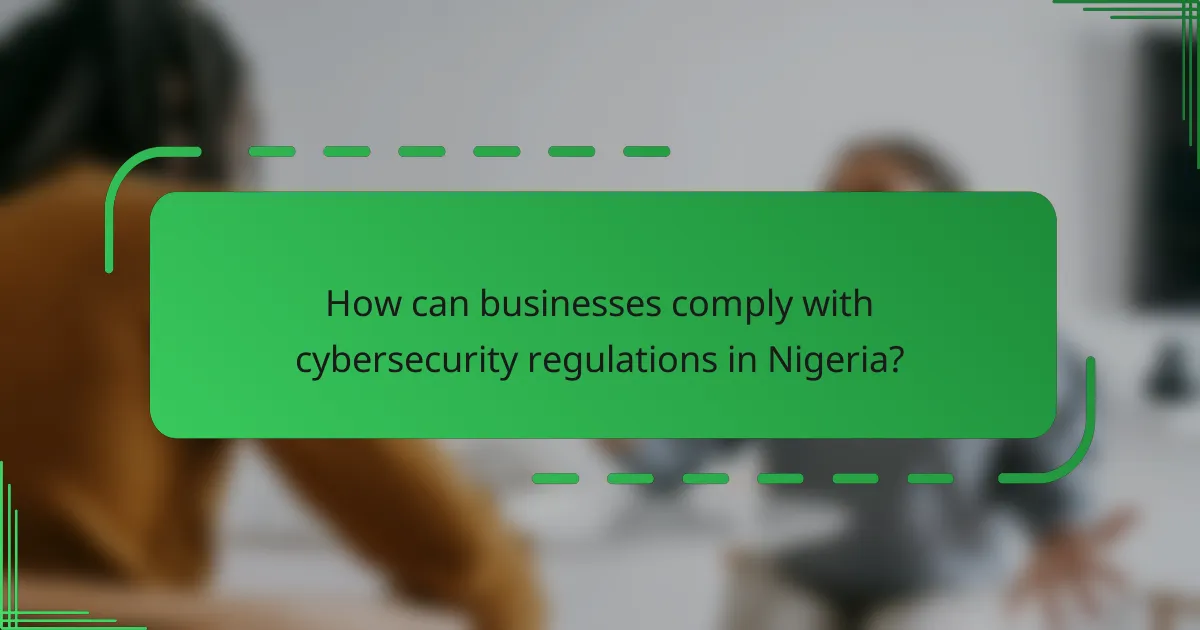
How can businesses comply with cybersecurity regulations in Nigeria?
Businesses in Nigeria can comply with cybersecurity regulations by adhering to established guidelines, ensuring data protection, and conducting regular audits. Understanding and implementing these measures is crucial for safeguarding sensitive information and maintaining compliance with local laws.
NITDA guidelines
The National Information Technology Development Agency (NITDA) provides a framework for cybersecurity compliance in Nigeria. These guidelines emphasize the need for organizations to develop a cybersecurity policy, conduct risk assessments, and implement appropriate security measures to protect data.
Businesses should familiarize themselves with the NITDA guidelines, which include best practices for incident response, employee training, and data encryption. Regular updates to these policies are essential to adapt to evolving cyber threats.
Data Protection Regulation compliance
Compliance with the Nigeria Data Protection Regulation (NDPR) is mandatory for businesses that handle personal data. This regulation outlines the rights of data subjects and the obligations of data controllers and processors to ensure data privacy and security.
To comply with the NDPR, organizations must obtain consent from individuals before processing their data, implement data protection measures, and appoint a Data Protection Officer (DPO). Regular training for employees on data handling practices is also recommended to minimize risks.
Regular audits and assessments
Conducting regular audits and assessments is vital for maintaining compliance with cybersecurity regulations. These evaluations help identify vulnerabilities and ensure that security measures are effective and up-to-date.
Businesses should schedule audits at least annually and after significant changes in their operations or IT infrastructure. Utilizing third-party auditors can provide an objective assessment and highlight areas for improvement, ensuring ongoing compliance with NITDA and NDPR standards.

What are the best practices for cybersecurity in Nigeria?
The best practices for cybersecurity in Nigeria involve implementing robust measures to protect sensitive data and systems from threats. Key strategies include regular software updates, strong password policies, and effective network segmentation to mitigate risks.
Regular software updates
Regular software updates are crucial for maintaining cybersecurity in Nigeria. Keeping operating systems, applications, and security software up to date helps protect against vulnerabilities that cybercriminals may exploit.
Organizations should establish a routine for checking for updates and applying them promptly. This can include automatic updates where feasible, as well as regular audits to ensure all systems are current.
Strong password policies
Implementing strong password policies is essential for safeguarding accounts and sensitive information. Passwords should be complex, combining upper and lower case letters, numbers, and special characters, and should be changed regularly.
Encouraging the use of password managers can help users create and store unique passwords for different accounts. Additionally, organizations should consider implementing two-factor authentication to add an extra layer of security.
Network segmentation
Network segmentation involves dividing a computer network into smaller, isolated segments to enhance security. This practice limits the spread of cyber threats and helps protect sensitive data by restricting access to critical systems.
In Nigeria, businesses can implement segmentation by using firewalls and virtual local area networks (VLANs) to control traffic between different network segments. Regularly reviewing and updating segmentation strategies is important to adapt to evolving threats.
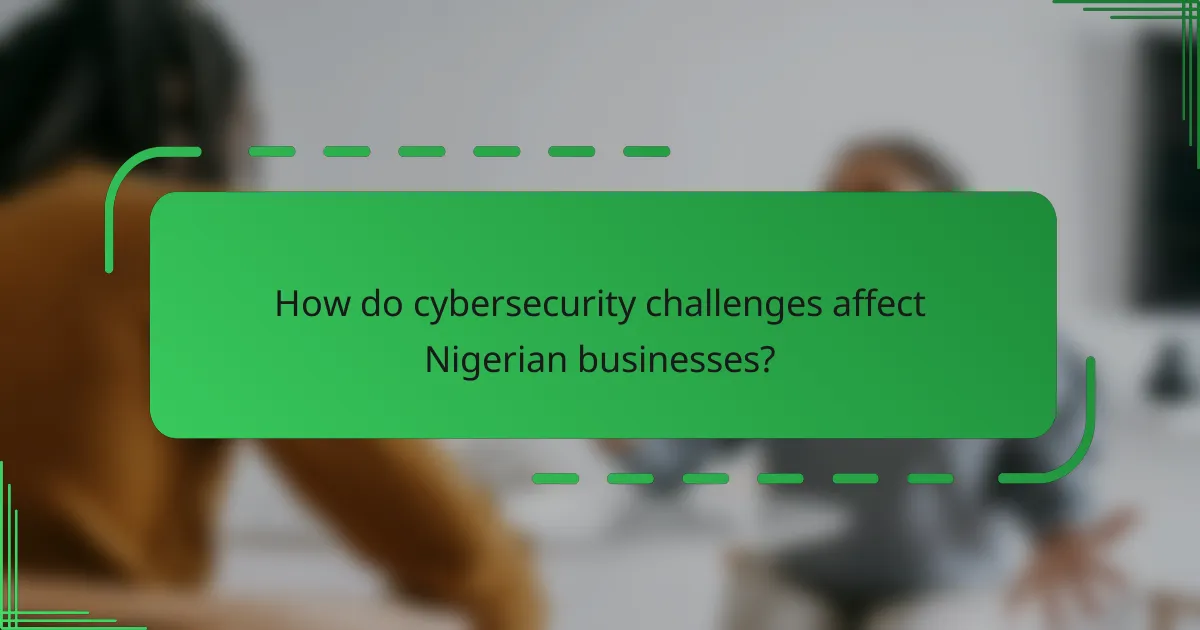
How do cybersecurity challenges affect Nigerian businesses?
Cybersecurity challenges significantly impact Nigerian businesses by exposing them to various risks that can hinder growth and sustainability. These challenges can lead to financial losses, damage to reputation, and operational disruptions, all of which can have long-lasting effects on a company’s viability.
Financial losses
Nigerian businesses face substantial financial losses due to cybersecurity incidents, which can range from direct theft to recovery costs. For instance, a data breach may result in immediate financial damage, while the long-term costs of legal fees and regulatory fines can accumulate significantly. Companies may also experience increased insurance premiums as a result of frequent incidents.
Additionally, businesses may lose revenue during downtime caused by cyberattacks, which can last from hours to days. Investing in robust cybersecurity measures can mitigate these losses, but the initial costs may be a barrier for smaller enterprises.
Reputation damage
Reputation damage is a critical concern for Nigerian businesses facing cybersecurity challenges. A single breach can erode customer trust, leading to a decline in sales and customer loyalty. Companies that fail to protect sensitive data may find it difficult to regain the confidence of their clients, which can take years to rebuild.
Furthermore, negative media coverage following a cybersecurity incident can tarnish a brand’s image, affecting partnerships and collaborations. Maintaining transparency and communicating effectively with stakeholders during a crisis can help mitigate reputational harm.
Operational disruptions
Operational disruptions caused by cybersecurity threats can cripple Nigerian businesses, affecting their ability to function effectively. Cyberattacks such as ransomware can lock critical systems, halting operations and leading to significant delays in service delivery. This can be particularly damaging in sectors like finance and healthcare, where timely access to information is crucial.
To minimize disruptions, businesses should develop and regularly update incident response plans. Training employees on cybersecurity awareness can also help prevent attacks that lead to operational downtime, ensuring smoother business continuity.
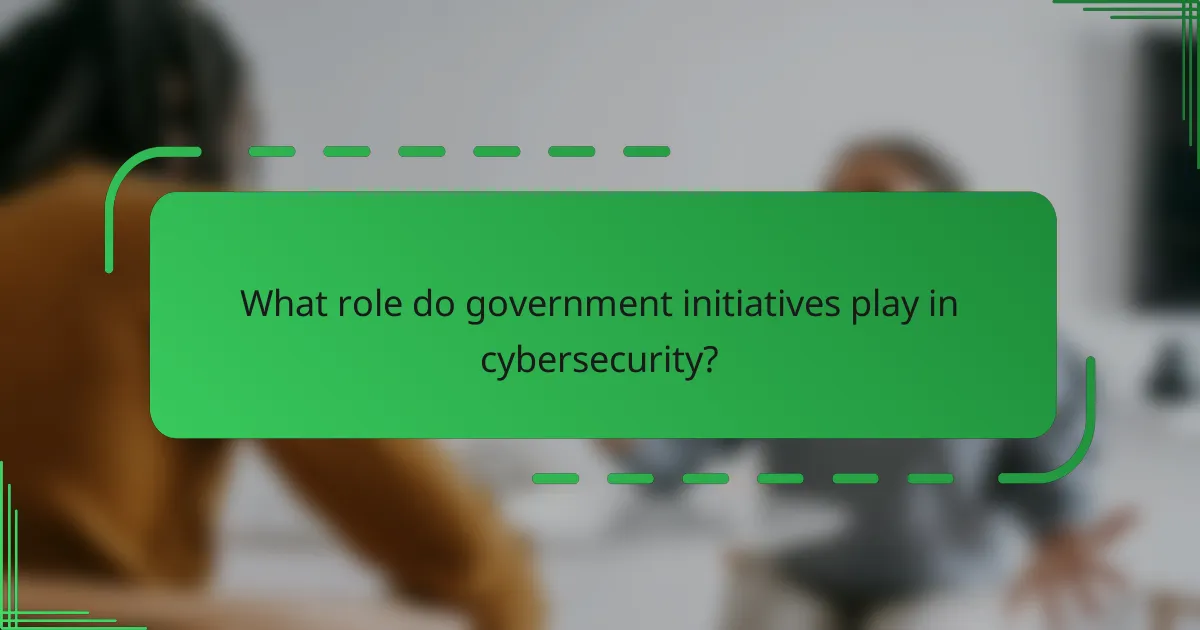
What role do government initiatives play in cybersecurity?
Government initiatives in Nigeria are crucial for enhancing cybersecurity by establishing frameworks, regulations, and support systems. These initiatives aim to protect national infrastructure, promote awareness, and foster collaboration among stakeholders.
National Cybersecurity Policy
The National Cybersecurity Policy outlines Nigeria’s strategic approach to managing cyber threats. It emphasizes the importance of protecting critical information infrastructure and encourages public-private partnerships to enhance security measures.
Implementation of this policy involves regular assessments of cybersecurity risks and the development of response strategies. Stakeholders are urged to align their practices with the policy to ensure a unified defense against cyber threats.
Cybersecurity Awareness Programs
Awareness programs initiated by the government aim to educate citizens and organizations about cybersecurity risks and best practices. These programs often include workshops, seminars, and online resources to promote safe online behavior.
By increasing awareness, the government seeks to reduce the number of successful cyber attacks. Citizens are encouraged to adopt strong passwords, recognize phishing attempts, and report suspicious activities to authorities.
Collaboration with International Bodies
Nigeria collaborates with international organizations to strengthen its cybersecurity posture. This includes partnerships with entities like the International Telecommunication Union (ITU) and the African Union (AU) to share knowledge and resources.
Such collaborations help Nigeria stay updated on global cybersecurity trends and best practices. They also facilitate access to technical assistance and funding for cybersecurity initiatives.
